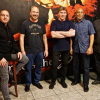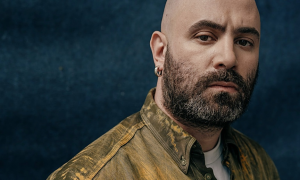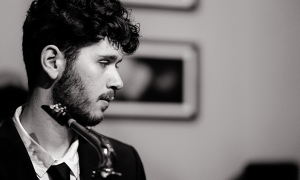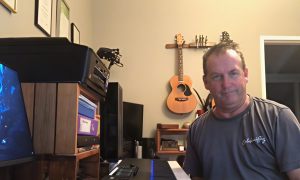Home » Jazz Articles » Take Five With... » Take Five with AXIOM
Take Five with AXIOM
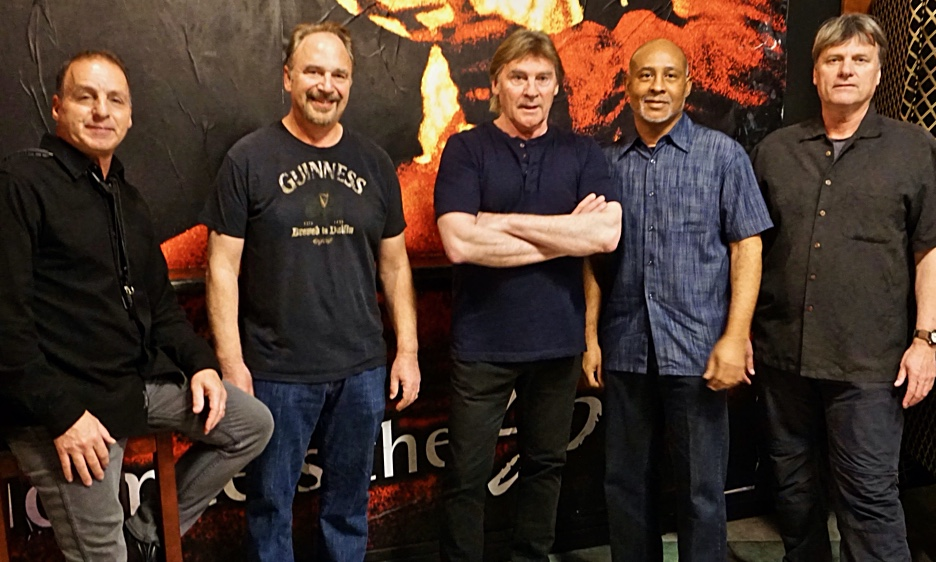
Meet Axiom
Founded and brought together by brothers Pete and Phil Templer, guitarist/composer and drummer/percussionist/composer respectively, the goal was to establish a creative and engaging environment to present a dynamic musical experience to audiences of all types.Pete and Phil both hail from the Midwest where they began their musical journey studying and playing in a variety of venues at early ages. Both enrolled in various musical colleges; Pete studied at Berklee and University of Miami under Jerry Coker. Together and separately they have played many different styles of music and venues throughout the U.S. before relocating on the West Coast, first in the Bay Area and then in the L.A. area.
Axiom has, to date, released two CDs with a third, Starburst, now in release.The first release, Spirit of Light, featured Grammy award nominee, David Benoit, and received National airplay and favorable coverage from the jazz press.
Axiom has appeared at numerous venues, jazz clubs, festivals and concert halls, performing with noted artists including The Rippingtons, Larry Carlton, Lee Ritenour, Kirk Whalum, Tom Scott, Billy Childs, Brian Bromberg, Poncho Sanchez and The Steve Morse Band and many more.
Instruments:
Phil utilizes both DW and Yamaha acoustic drum kits as well as Roland electronic percussion modules in his setup.Pete: Godin LGXT Guitar: Roland GR33 Guitar Synth, Roland VG88 Modeler, Digitech RP1000 Effects Processor, KORG A3 Effects Processor.
Teachers and/or influences?
Phil: For me Gaeton Caviola, a protégé of Louis Bellson was an early influence and teacher. Other influences (to name a few) would be: Ginger Baker, The Motown Studio drummers, Art Blakey, Buddy Rich, Billy Cobham, Tony Williams, Bill Bruford... I could go on.Pete: Studied with Pat Metheny at University of Miami Jazz Dept. and Mick Goodrick at Berkley College of Music. Influences: Jeff Beck, John McLaughlin, Wes Montgomery, Pat Metheny, Bill Connors and Larry Carlton.
I knew I wanted to be a musician when...
Phil: It was just something I gravitated to. Just about everyone in our family played music in some fashion. I have always loved music and wanted to be a part of the music making experience.Pete: Watching my older brother rehearse with his rock band in our basement. He gave me my first guitar and showed me the basics before taking formal lessons
Your sound and approach to music.
Phil: My approach to drumming has been to be more than just a timekeeper for the band. I understand that this, at times, has been in conflict to others' opinions of what a drummer should be, but I wanted to be involved in the compositions and performances in other ways too. Also, I have been experimenting and using electronic percussion for many years and have always tried to have an open mind as to what can be utilized for percussion sounds.Pete: It's all about melodic composition. The composition dictates my sound be it overdrive guitar, acoustic guitar or inspirational sounds driven by my various electronic devices. My diverse influences are reflected throughout our compositions.
Your teaching approach
Phil: In addition to sticking and drum set fundamentals, I always emphasize listening closely to what the other players are doing and work off of that as well as learning when it is time to lead and when it is time to follow.Pete: Having taught all ages privately and in music schools my approach depended upon the student's experience, starting with the basics and on up to mastering the fingerboard with the seven finger patterns and their respective modes and how they apply to improvising.
Your dream band
Phil: Hey, the current AXIOM is more that just a dream band; it is a reality band. These guys are absolutely dedicated and extremely talented. What more could we ask for?Road story: Your best or worst experience
Playing for the Dali Lama in Santa Cruz was a great experience. There were a lot of tough road gigs early on. We always tried to avoid staying at the "Band House"Favorite venue
The Saban Theater in Beverly Hills is a classic grand old theater with great acoustics. We did shows there with Larry Carlton and Jon Anderson of YES and had a great time on both occasions.What do you think is the most important thing you are contributing musically?
As a band we are continuing to try and create new compositions that push Progressive and Fusion Jazz/Rock sounds forward rather than just looking backward. I hate genre labels though. I think too much time really is spent on looking back at older compositions rather than looking forward and creating new ones. I think this is true for most genres these days,Did you know...
Phil: I love to spend time outdoors in the mountains and have done a fairly significant amount of backpacking including the John Muir Trail in the Sierras.The first jazz album I bought was:
Phil: The first jazz albums I really listened to were Miles Davis' Bitches Brew and Quincy Jones Walking in Space.Pete: My first important jazz albums at an early age (teens) were Wes Montgomery's Bumpin' and Claus Ogerman's Soul Searchin'.
Music you are listening to now:
Pete: I'm not focusing on any particular artist/album but am trying stay up on current contributions to the contemporary jazz fusion genre as well as revisiting the classics; too numerous to mention.Phil: Simon Phillips: Protocol 4. I recently watched (and listened) to some old videos of the R&B bands of the '70s (Spinners, Earth Wind and Fire, Temptations etc.) They were great although the shows seem pretty corny, but the songs were really memorable and those harmonies...
Also, Ray Lyon's Beginning to See. I like some of the things Ray Lyon has done. He is a fairly unknown artist but the compositions are really compelling. Chick Webb— I always like to spend some time listening to the guys who started it all
Desert Island picks:
Jean-Luc Ponty: Enigmatic Ocean (Atlantic) McCoy Tyner: Fly with the Wind (Milestone) Tony Williams: Believe It (Columbia) Miles Davis: Kind of Blue (Columbia) Return to Forever: Romantic Warrior (Columbia)How would you describe the state of jazz today?
Like so many genres, it seems like it is at another crossroads and is trying to figure out how to encourage younger people to listen and to stay relevant, not just in a nostalgic fashion. Jazz can't just rely on the renditions of old jazz standards to accomplish this. These will always have a place, but I have always thought Miles' attitude was the best way forward. Don't look back, always push forward.What are some of the essential requirements to keep jazz alive and growing?
See above.What is in the near future?
The Pandemic has presented enormous performance challenges. We, like everyone else, have had many show opportunities canceled with re-bookings tentative at best. We have just released our latest album, Starburst, but also have compositions for a new project. We are also planning for some streaming events.What is your greatest fear when you perform?
Phil: Well that's pretty simple. Will we get it right? Will the audience be receptive? And hopefully there are no technical problemsWhat song would you like played at your funeral?
Phil: How about Return to Forever's "No Mystery" or on second thought, maybe Stevie Wonder's "Don't You Worry Bout a Thing."What is your favorite song to whistle or sing in the shower?
Phil: Lately it's been "The World is a Ghetto. Not exactly sure why but there it is.By Day:
Phil: I got interested in Programming in the early nineties and Pete and I got involved with a software company pioneer that has provided pretty steady revenue and at the same time enabled us to continue our musical adventures.If I weren't a jazz musician, I would be a:
Historian.If I could have dinner with anyone from history, who would it be and why?
Phil: How about Marco Polo? A truly great adventurer and someone who was interested in other cultures.Pete: Leonardo Da Vinci: He would have been a fascinating conversationalist on many topics.
Tags
Take Five With...
Axiom
GoMedia PR
David Benoit
The Rippingtons
Larry Carlton
Lee Ritenour
Kirk Whalum
Tom Scott
Billy Childs
Brian Bromberg
Poncho Sanchez
Steve Morse
Art Blakey
Buddy Rich
Billy Cobham
Tony Williams
Bill Bruford
Mick Goodrick
jeff beck
john mclaughlin
Wes Montgomery
Bill Connors
Miles Davis
Quincy Jones
Simon Phillips
Chick Webb
Jean-Luc Ponty
McCoy Tyner
Return To Forever
pat metheny
PREVIOUS / NEXT
Support All About Jazz
 All About Jazz has been a pillar of jazz since 1995, championing it as an art form and, more importantly, supporting the musicians who make it. Our enduring commitment has made "AAJ" one of the most culturally important websites of its kind, read by hundreds of thousands of fans, musicians and industry figures every month.
All About Jazz has been a pillar of jazz since 1995, championing it as an art form and, more importantly, supporting the musicians who make it. Our enduring commitment has made "AAJ" one of the most culturally important websites of its kind, read by hundreds of thousands of fans, musicians and industry figures every month.


